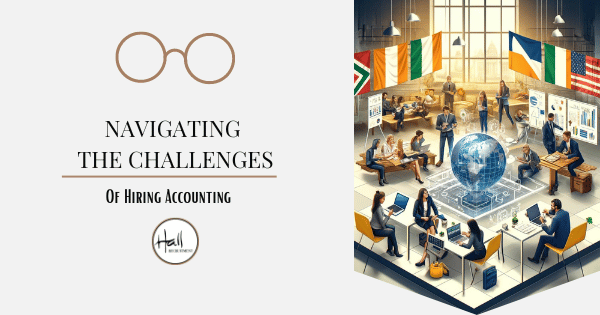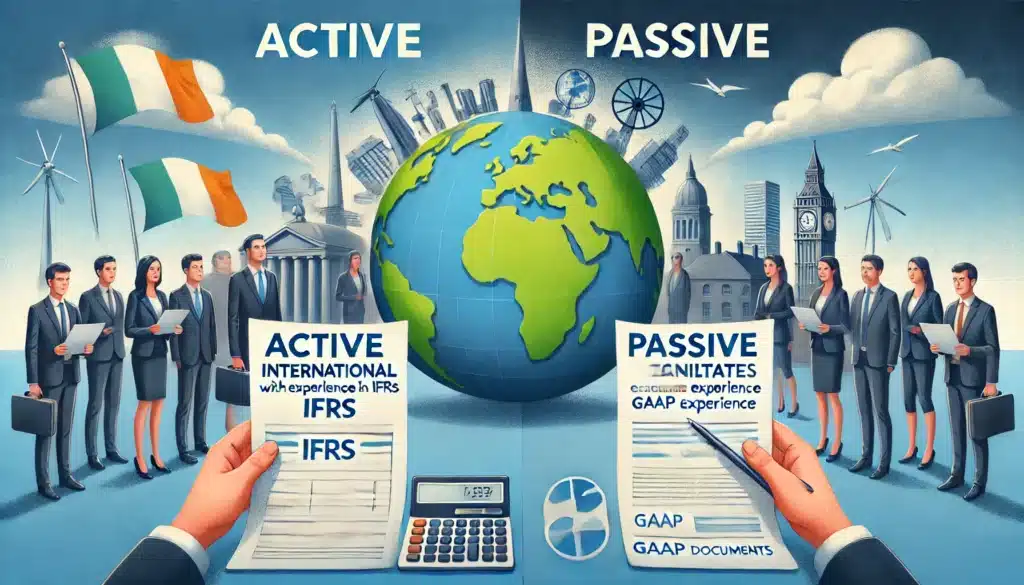
- Navigating the Challenges of Hiring Accountants in Ireland
- The Active Market vs. The Passive Market
- The Role of the Recruiter
- Bridging the Expectation Gap
- The GAAP vs. IFRS Conundrum
- Why GAAP Experience is Essential
- The Day-to-Day Impact of GAAP Knowledge
- Responsibilities of the Candidate
- A Potential Training Plan for GAAP Knowledge
- Cost of Training vs. Salary Increase
- Conclusion
Navigating the Challenges of Hiring Accountants in Ireland
Ireland has recently experienced a notable influx of international migrants and asylum seekers, significantly impacting the job market. This influx includes both legitimate migrants who come to Ireland legally for work and education, and undocumented migrants and asylum seekers. Unfortunately, the positive contributions of those who come through official channels are often overshadowed by the broader, more negative perceptions surrounding undocumented migrants. This paints all migrants with the same brush, despite the valuable skills and enthusiasm that legal migrants bring to the table.

The Active Market vs. The Passive Market
In the current employment market, employers are finding it increasingly challenging to match their expectations with those of potential candidates, especially in the accounting sector. The job market is divided into two distinct categories: the active market and the passive market.
The Active Market
The active market is primarily populated by international applicants who are eager to work in Ireland. These candidates usually have experience with International Financial Reporting Standards (IFRS) rather than the Irish Generally Accepted Accounting Principles (GAAP). Their primary motivation is finding employment, and they bring with them a fresh perspective and a willingness to integrate into the Irish workforce. However, the lack of GAAP experience can be a significant hurdle.
The Passive Market
On the other hand, the passive market consists of individuals who possess the desired GAAP experience and are familiar with the local market. These candidates are typically already employed and are only willing to consider new opportunities for a substantial salary increase. Unfortunately, many employers cannot meet these high salary demands, leading to a stalemate where both parties’ expectations are not met.

The Role of the Recruiter
Recruiters play a pivotal role in bridging the gap between employers and potential candidates. They act as intermediaries, helping both sides navigate the complexities of the job market and manage expectations. Recruiters can assist in addressing critical questions and strategies:
- Determining Competitive Salaries: Employers need to understand the competitive salary ranges to attract candidates with specific skills. For example, “If I need a candidate with A & B skills, what salary should I be advertising?”
- Training and Development: When faced with a market where candidates lack local accounting experience, employers should consider implementing training processes. A question like, “What process should I put in place to train candidates with no local market accounting experience?” becomes crucial.
- Candidate Preparedness: Recruiters also emphasise the importance of candidates ensuring their qualifications are internationally recognised and relevant to the Irish market.
Bridging the Expectation Gap
The employment market right now is a challenging place. Employers and candidates often find it difficult to meet in the middle regarding each other’s expectations. Employers are looking for candidates with specific local experience, while many candidates are eager to work but lack that local knowledge. It’s a classic case of supply and demand not aligning perfectly, requiring flexibility and adaptation from both sides.

The GAAP vs. IFRS Conundrum
Understanding the significance of GAAP experience for accountants in Ireland is essential. GAAP (Generally Accepted Accounting Principles) is a framework of accounting standards, rules, and procedures that are specific to the country or region. In Ireland, as in many other jurisdictions, GAAP dictates how financial statements should be prepared and reported.
Why GAAP Experience is Essential
- Regulatory Compliance: GAAP ensures that financial statements comply with local laws and regulations. Accountants familiar with GAAP can navigate the specific requirements of Irish accounting standards, ensuring that companies remain compliant with legal obligations.
- Tax Reporting: GAAP directly affects tax reporting and the preparation of tax returns. Different countries have varying tax laws, and accountants need to be adept at applying GAAP to accurately report and file taxes in Ireland.
- Financial Reporting: GAAP impacts how financial statements are presented to stakeholders, including investors, creditors, and regulatory bodies. Properly prepared GAAP-compliant financial statements provide a true and fair view of a company’s financial health.
- Audit Readiness: Companies in Ireland are subject to audits, and GAAP-compliant financial statements are crucial for smooth audit processes. Accountants with GAAP experience can ensure that financial records are audit-ready, reducing the risk of discrepancies and penalties.
The Day-to-Day Impact of GAAP Knowledge
For an international accountant with only IFRS experience, the lack of GAAP knowledge can be a significant barrier:
- Adjustment to Local Practices: Accountants must adjust to the nuances of GAAP, which may involve different methodologies for revenue recognition, expense reporting, and asset valuation compared to IFRS.
- Learning Curve: The transition from IFRS to GAAP can be steep. Accountants must invest time and effort to learn and apply GAAP principles effectively, impacting their productivity and efficiency in the short term.
- Communication with Local Stakeholders: Familiarity with GAAP is crucial for effective communication with local stakeholders, including financial teams, auditors, and regulatory authorities. Misunderstandings or misapplications of GAAP can lead to significant errors and misunderstandings.
Responsibilities of the Candidate
Candidates seeking accounting roles in Ireland must take proactive steps to improve their employability:
- Qualification Recognition: Ensure that their accounting qualifications are recognised in Ireland. Key qualifications include:
- Chartered Accountant (CA)
- Certified Public Accountant (CPA)
- Chartered Institute of Management Accountants (CIMA)
- Association of Chartered Certified Accountants (ACCA)
For accounting technicians, relevant qualifications include:
- Accounting Technician Ireland (ATI)
- Institute of Certified Public Accountants in Ireland (CPA Ireland)
- Understanding Local Requirements: Candidates should research and understand the specific requirements and standards of the Irish accounting sector, such as GAAP and local tax regulations.
- Language and Communication: Despite English being widely spoken, candidates should work on adapting to local accents, idioms, and business communication norms in Ireland.
A Potential Training Plan for GAAP Knowledge
To bridge the gap for accountants with only IFRS experience, employers can implement a comprehensive training plan. Here’s a detailed outline of such a plan:
Phase 1: Initial Assessment (2 Weeks)
- Objective: Assess the candidate’s current knowledge of IFRS and identify gaps in GAAP knowledge.
- Activities: Conduct assessments and interviews, review previous work experience, and set learning objectives.
Phase 2: Course Training (4 Weeks)
- Objective: Provide a thorough understanding of Irish GAAP principles, tax regulations, and financial reporting standards.
- Activities: Engage in interactive sessions, led by experienced trainers. Topics covered should include revenue recognition, expense reporting, asset valuation, and compliance requirements.
Phase 3: Practical Workshops (4 Weeks)
- Objective: Apply GAAP knowledge to real-world scenarios and case studies.
- Activities: Participate in hands-on workshops, group projects, and simulations of Irish financial reporting. This phase should also include training on local tax reporting and audit preparation.
Phase 4: Mentorship and On-the-Job Training (8 Weeks)
- Objective: Gain practical experience under the supervision of a mentor.
- Activities: Work on actual company accounts, participate in audits, and receive feedback from mentors. Regular check-ins and progress evaluations are essential during this phase.
Phase 5: Evaluation and Certification (2 Weeks)
- Objective: Assess the candidate’s proficiency in GAAP and certify their readiness.
- Activities: Conduct final assessments, provide certification upon successful completion, and gather feedback for continuous improvement of the training programme.
Cost of Training vs. Salary Increase
Cost of Training
- Total Duration: 20 weeks (approximately 5 months)
- Training Costs:
- Course Training: €2,500 (estimate)
- Practical Workshops: €3,000 (estimate)
- Mentorship Programme: €4,000 (estimate)
- Certification: €1,500 (estimate)
- Total Cost per Candidate: €11,000 (Approximate)
Note: The training costs provided are estimates and may vary depending on the specific training providers, programme length, and individual company needs.
Cost of Increasing Salary for GAAP-Experienced Candidates
- Current Average Salary for GAAP-Experienced Accountants: €60,000
- Proposed Salary Increase to Attract Candidates: €70,000
- Annual Cost Increase per Candidate: €10,000
Comparative Analysis
Training a candidate with IFRS experience to gain GAAP proficiency costs approximately €11,000 over five months. In contrast, increasing the salary to attract a GAAP-experienced candidate costs an additional €10,000 annually. While the upfront training cost is slightly higher, it is a one-time investment compared to the recurring annual salary increase. Furthermore, training builds a loyal workforce and increases the pool of GAAP-competent accountants in the long term.

Conclusion
The distinction between legitimate migrants and undocumented individuals is crucial in appreciating the positive contributions of those who come to Ireland through official channels. The job market, particularly in accounting, is tough terrain to navigate right now. Employers must be adaptable and realistic about their expectations, leveraging the role of recruiters to find the right fit. By addressing these pain points and implementing comprehensive training plans, employers can better attract and integrate international accountants into the Irish workforce, ultimately benefiting from their diverse skills and perspectives. The goal is to create a harmonious balance where both employers and candidates find common ground and move forward together.
